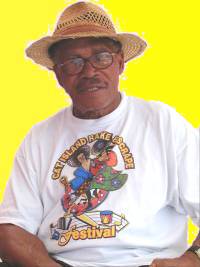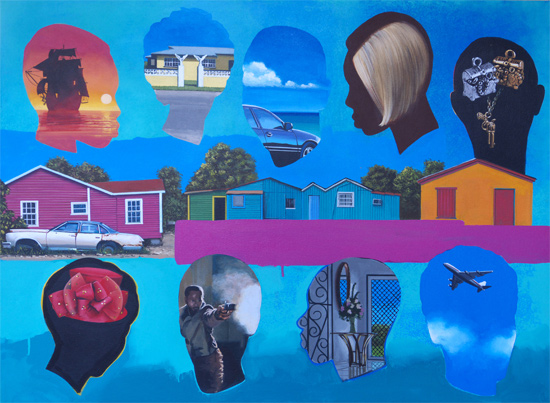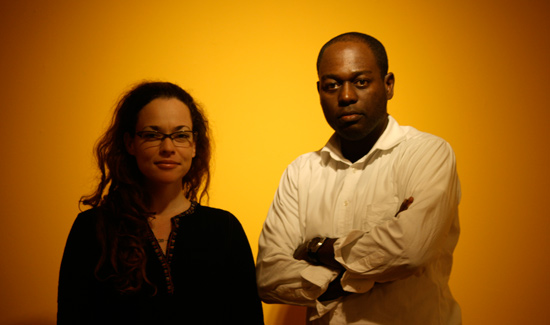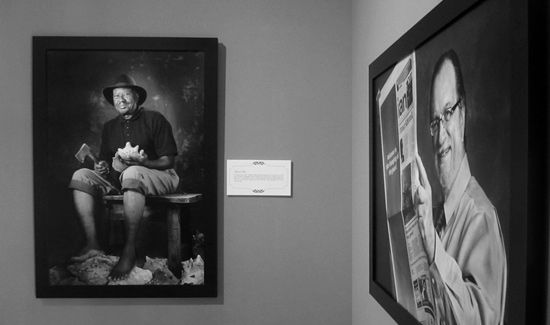 The Village comprised of an area called the Big Yard, Museum and Art Gallery, the movie room, homestead, culture gardens, historic and documents center, arts and crafts commercial center and the theater for the performing arts with a seating capacity of 400. As the minister of finance, Carlton Francis assisted the project greatly. The first Jumbey Festival was held at Jumbey Village on Blue Hill Road in 1971 and the last one was held in 1973.
The Village comprised of an area called the Big Yard, Museum and Art Gallery, the movie room, homestead, culture gardens, historic and documents center, arts and crafts commercial center and the theater for the performing arts with a seating capacity of 400. As the minister of finance, Carlton Francis assisted the project greatly. The first Jumbey Festival was held at Jumbey Village on Blue Hill Road in 1971 and the last one was held in 1973.
In 1973, Livingstone Coakley, then minister of education, instructed me to broaden the scope of the community development program and prepare a Cabinet paper for the approval of the same. We submitted the paper in November 1973. The introduction of the paper was as follows: By previous memoranda Cabinet has been kept informed of the progress of community development program which also incorporates the cultural and recreational program for the development of the youth of this commonwealth. The government must in keeping with its policy recognize that community development must play a vital role in the development of this nation specifically mentioned in the white paper. This program was designed to promote social and cultural stability especially among the young people of the nation and we celebrated when we received the news that the youth development program was adopted by Cabinet. I was utterly shocked when I discovered a few days before the budget was tabled that the approved program was not in the budget. I demonstrated on the floor of Parliament and was spitefully fired by the prime minister.
The Context of the Times
The year 1974 was a rough one for The Bahamas. The decision to become independent in 1973 led to a rise in unemployment and we became somewhat paralyzed as a nation. The rift among government members and backbenchers over the takeover of the casinos by government, the resignation of Carlton Francis and the dismissal of the parliamentary secretary for community development did great damage to the Progressive Liberal Party and the government.
As a result of social and economic problems looming there was unrest in the country. I decided to take a stand and planned a march on Parliament to awaken the government. We organized a march for May 29, 1974 and at the same time I tabled a resolution in Parliament requesting a select committee to consider the social, cultural and economic plight of the Bahamian people. At 9 a.m. hundreds gathered at Jumbey Village with placards and marched from over the hill, arriving at the House of Assembly at 10 a.m. singing songs of comfort. I moved the resolution on the floor of the House of Assembly calling for a select committee to consider the social, cultural and economic plight of the Bahamian people with powers to send for persons and papers and with leave to sit during the recess, and it was unanimously adopted by parliamentarians. The select committee completed an interim report on the economic problems which loomed in the face of the Bahamian people and the report was laid on the table of the House of Assembly on September 4, 1974.
Shortly after the report was tabled, I was informed by the prime minister that the report would be deferred by ministers back to the committee. After the meeting with the prime minister, I was shocked to learn that the figures provided to the committee by the Department of Statistics were changed after the report was tabled. The committee came to conclusions and made recommendations on the following programs:
1. Touristic facilities.
2. Agriculture and fisheries.
3. Light industries.
4. Entertainment industry.
5. Youth development schemes.
Members of the committee came to the conclusion that the plan of action that had great promise for the people was sabotaged by members of the government.
Today, this country is going through a major crisis and is on the border of anarchy. Many are wondering how we arrived at this critical stage. I am compelled to reflect on the revolution of January 1967 when we danced and celebrated our newfound freedom and I also remember how we soon forgot our responsibilities to those who elected us. I have vivid memories of our commitment to true freedom. Then we had the available resources and the attitude of the people to accomplish anything we desired of them.
I would like to thank Sir Stafford Sands for his vision and commitment to our Bahamas. He must be given credit for his efforts in laying the ground work in 1966 for a massive urban development program. It was during this period that he commissioned a study that was prepared for the government of The Bahamas by the Institute of Urban Environment and the Division of Urban Planning of the School of Architecture of Columbia University in New York City. This study began in 1966 and was completed during the PLP government’s first term in 1967. The study recommended sweeping social development action in Over-the- Hill areas in New Providence. It should be noted that every serving member of the House of Assembly during that term was issued a copy of that document. I am convinced that this plan had the key to most of today’s problems and would have transformed over the hill. What a tragedy.
Today’s Situation
Urban Renewal 2.0, as we know it today, is a work in progress. I am of the view that the fundamental problem is that it is not structured correctly; for instance, the use of members of the Royal Bahamas Police Force and the overlapping of social services and urban development. Urban development is a highly technical field requiring qualified, well-trained people to develop the whole man or woman. Social services, on the other hand, is catering to the poor and the underprivileged who are in dire need of social help like food, shelter and immediate assistance during mishaps like fires, hurricanes, flooding and other disasters. If the urban development is to be successful there has to be a separation among social services, urban development and interventions of the police force. The involvement of police should focus more on community policing exclusively, which deals with the symptoms of crime rather than the rehabilitation of criminals. We cannot afford to have our officers in khaki uniforms talking about social issues as a primary focus. It gives the wrong impression and sends the wrong message. Their role is defined as police officers in our country and they should be focusing on their mandate to protect and serve the individuals and the community. Additionally, urban development encompasses creating sustainable and meaningful development programs to be executed throughout the Commonwealth of The Bahamas. There is no need to reinvent the wheel. There are well-written, documented community development programs in the ministry from as far back as 1971 that can assist in bringing about the desired changes today. These programs are as relevant today as much as they were when they were written more than 40 years ago.
On February 8, 1976, I resigned from the Progressive Liberal Party. In my closing statement I said: “Over the years I served you to the best of my ability, because I fought for the principles and ideals for which I was elected and because I took the case of your social and economic plight to the halls of Parliament. I was maligned, victimized and most recently detained in a small, unhealthy cell for 12 hours without explanation. I have come to the conclusion that there is no freedom in the Progressive Liberal Party.”
In spite of the sacrifices made by the Bahamian people to construct Jumbey Village it meant nothing to the decision makers in 1987. I passed Jumbey Village one Friday evening in July 1987 and when I returned on Saturday morning it was flattened. Later, I was informed that they had to use explosives to blow away the theater. Can you imagine how traumatized I was to learn that our government had granted permission to blow up its nation’s cultural heritage? Words cannot express my sadness, anguish and the disappointment that I experienced concerning the destruction of Jumbey Village.
Today, we have become victims of a patronage system which destroys our ability to grow and excel. The social and economic conditions are indeed explosive and our leaders seem to be unable to meet the challenge. If we are to solve these problems, we have to search where we went wrong and admit it. It cannot be business as usual. We, the masters of the Quiet Revolution made mistakes somewhere along the lines and it is my humble belief that we all know what went wrong and who is responsible. We all must confess our transgressions and ask God for forgiveness. Our political leaders should take the lead. I have taken the high road in these matters. Although I have reasons to be bitter, I am not and neither should you be. We must rid ourselves of this cult atmosphere prevailing in the country and unite in a serious mission to build the nation.
In conclusion, it would be safe to say that the template to correct and fix most if not all of the social and economic problems was created many years ago, and well exemplified by the creation of Jumbey Village.
It is also safe to say that self-help and community involvement are not foreign concepts even if they now appear to be almost unknown to many Bahamians. But as in the past, committed and enlightened leadership is required to lift us out of the cesspit of social degradation in which we now find ourselves.
Urban Renewal as envisioned four decades ago involves the youth of the country and creates economic opportunities for the people and a deep sense of self-empowerment which can be successfully transmitted up and down the line across varying age levels.
Despite the decided reality of our political and philosophical differences, the bottom line is if we are to succeed as a caring nation, we must put aside some of the ever-present acrimony that certainly creates more harm than good. It would behoove us to rally our cooperative efforts behind those who are clearly committed to the overall improvement of our people as individuals and as communities.
If the government cannot accept advice, even in the face of the murderous scourge engulfing the country, then we are doomed. However, I am hopeful that the era of spiteful recriminations and tribal behavior is behind us and we can come together, government and opposition, church and civil society, for the common good. I am also hopeful that the promise of 1967 will finally be realized, where the good of the people trumps all other interests.
By: Edmund Moxey – former member of Parliament



